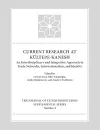
Current Research at Kueltepe/Kanesh
4 contributors - Hardback
£76.00
Levent Atici is an Associate Professor of Archaeology in the Department of Anthropology at University of Nevada, Las Vegas (UNLV). After receiving his Ph.D. from Harvard University, Atici joined UNLV in 2007 and founded the UNLV Zooarchaeology Laboratory in 2009. His research covers the full spectrum of human-animal interactions from hunting to taming to large-scale, industrial production of animals in specialized pastoralist societies in Southwest Asia. His current research program in Turkey comprises active field work at the Pre-Pottery Neolithic (PPNA) Körtik Tepe, Neolithic U?urlu Höyük, and Early through Late Bronze Age Kaman-Kalehöyük and Kültepe-Kanesh.Atici has published on Epipalaeolithic forager adaptations, food provisioning systems in early complex societies, and the relationships between food and ethnicity. Atici is committed to advancing zooarchaeology through fostering international collaboration, data sharing, and best practices.
Fikri Kulakoglu is Professor of Archaeology in the Department of Near Eastern Archaeology at Ankara University. His career in archaeology spans over thirty years in Turkey during which time he has participated in numerous fieldwork and directed excavations at Saraga Höyük and Kalehöyük in Gaziantep, and surveys in ?anl?urfa in southeast Anatolia. Since 2006 he has been the director of the Kültepe Project where he leads a large multinational and interdisciplinary team to excavate the ancient state of Kanesh, the capital of the Old Assyrian Trading Colony period in Anatolia where more than 23,000 tablets have been unearthed. In addition, he has conducted archaeological surveys in the same area, Kayseri Province in central Anatolia, since 2008, aiming to identify major trading settlements and trade routes around Kanesh. In 2010, he co-edited a book, Anatolia's Prologue: Kultepe Kanesh-Karum, that compiled a large corpus of scholarly work on the cuneiform archives from Kanesh.
Gojko Barjamovic is Lecturer on Assyriology at the Department of Near Eastern Languages and Civilizations at Harvard University. His research focuses on ancient economy and states. He also publishes works on the social and intellectual history of the ancient Near East, and he is an epigrapher for the Kültepe excavations in Turkey. He is the author of A Historical Geography of Anatolia in the Old Assyrian Colony Period (Copenhagen 2011) and co-author (with Thomas Hertel and Mogens Trolle Larsen) of Ups and Downs at Kanesh – Observations on Chronology, History and Society in the Old Assyrian {eriod (Leiden 2012). He is currently co-editing (with Kim Ryholt) two studies of canon and libraries in the ancient world: Libraries Before Alexandria and Canonicity and Identity Formation, and working on two archival studies of cuneiform texts: Old Assyrian Texts in the Yale Babylonian Collection, and The Archive of Kültepe 1994, House I.
Andrew Fairbairn is an Australian-based archaeobotanist. Trained at University College London’s Institute of Archaeology, he has published over sixty papers and books on projects in the UK, Hungary, Italy, Turkey, Syria, Jordan, Papua New Guinea, and Australia dating from 50,000 years of age to sites from the early twentieth century. After working for The Museum of London, Cambridge University, and the Australian University, he joined The University of Queensland in Brisbane as Lecturer in 2006 and from January 2014 is studying the ancient development of global plant trade as an Australian Research Council Future Fellow. Fairbairn’s work focuses on seeds, fruits, wood and tubers used by ancient peoples and gives an insight into the ancient diet, economy, and environment of our ancestors.